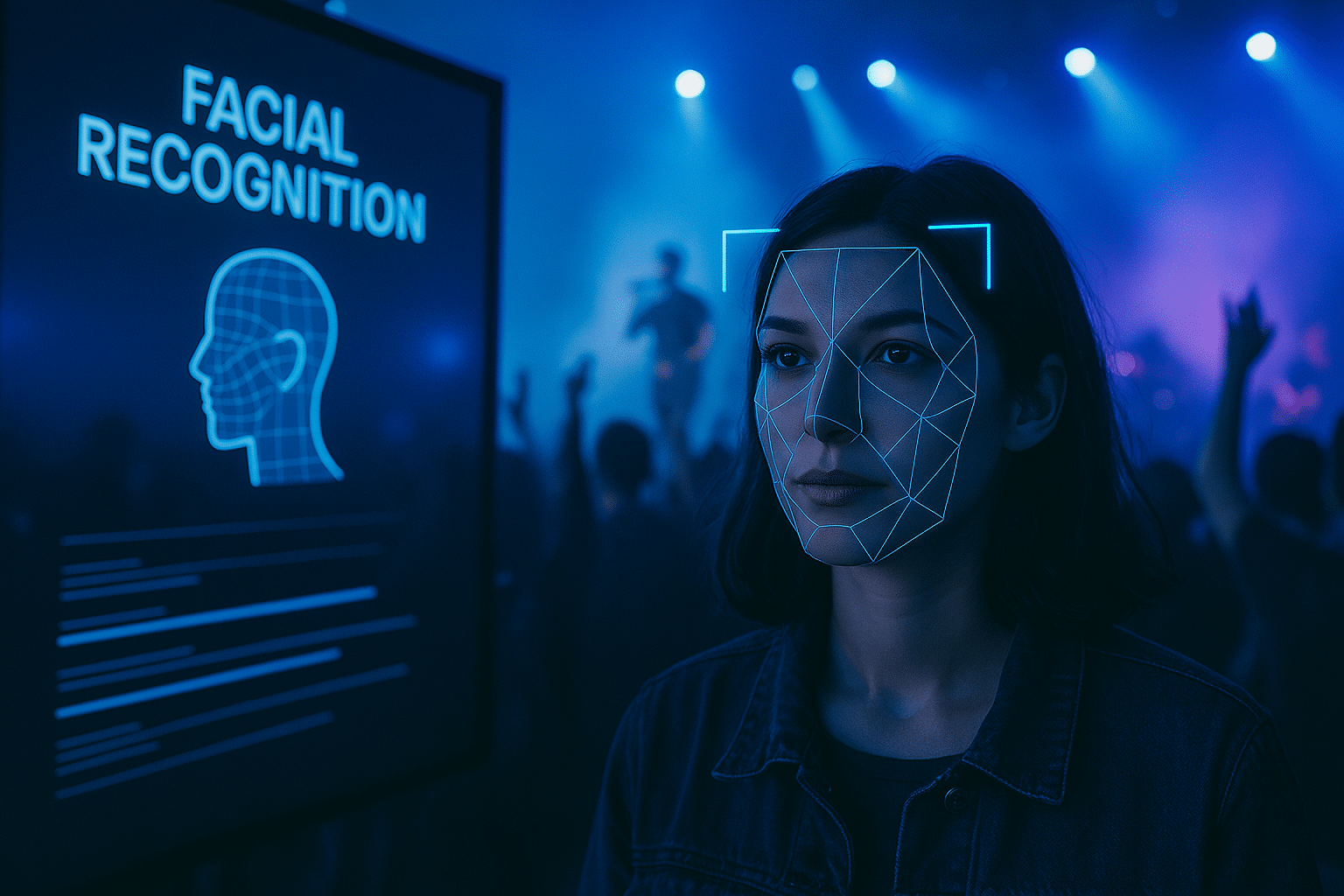
Facial recognition systems are increasingly used at concerts and festivals, scanning every face in the crowd and matching attendees to personal data. This high-tech surveillance turns a night of music into a data-gathering operation.
Big Brother at the Show: Government Surveillance is Real
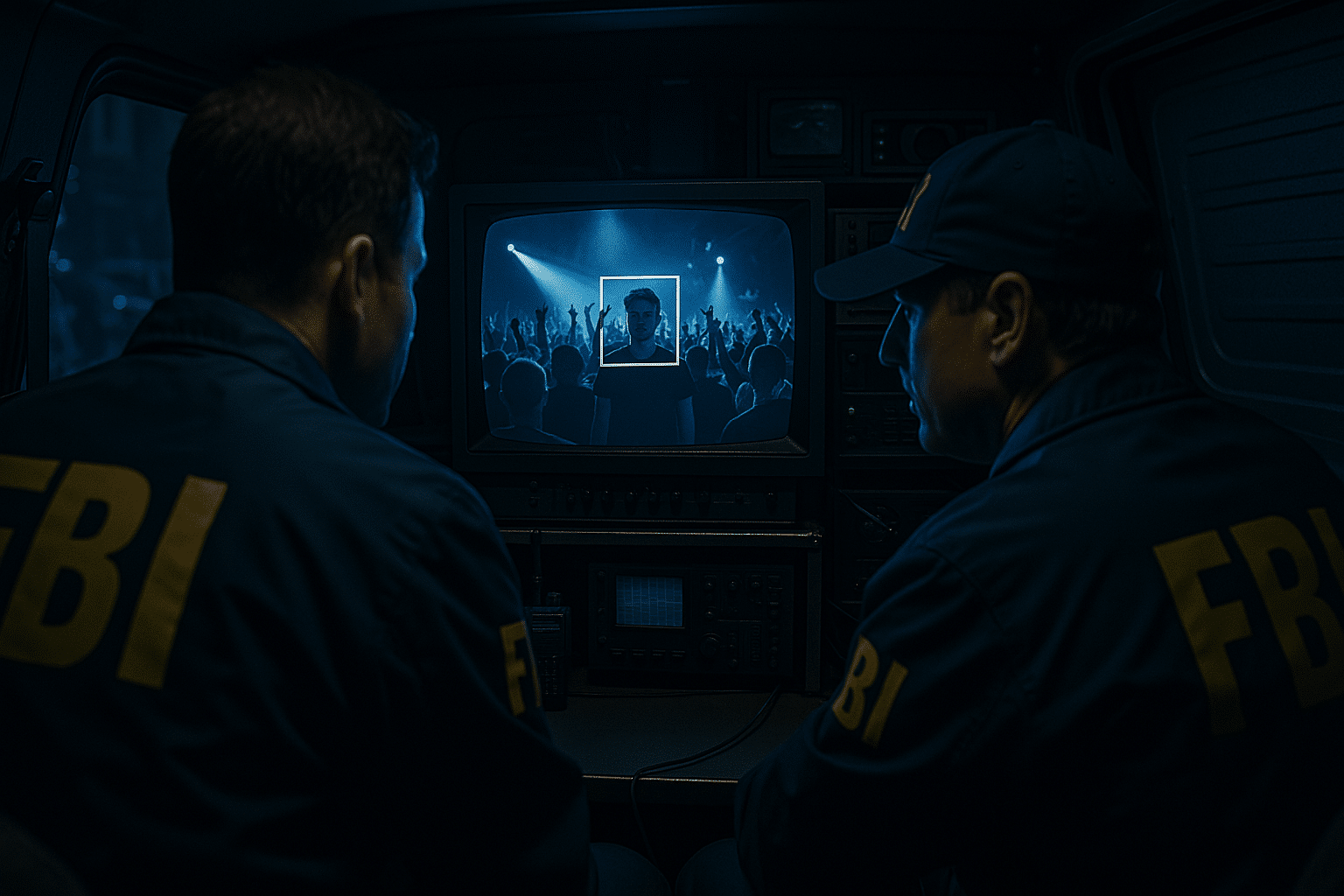
Concerts and festivals are meant to be escapes — places to enjoy live music and community. Yet evidence shows that government agencies often have eyes in the crowd, watching and recording. This isn’t paranoia; it’s documented reality. Freedom of Information Act (FOIA) requests and whistleblower leaks have revealed that agencies like the FBI (and even the CIA) have monitored music events for decades. For example, in the 1960s, the FBI and CIA conducted surveillance on folk music gatherings during the folk revival, tracking artists like Pete Seeger under suspicions of subversion. Even the 1960s pop band The Monkees had an FBI file – one band member is suing to see the full dossier of what the FBI collected on their concerts. If a Monkees show could end up in government files, it’s clear that authorities have long kept tabs on live events.
Fast forward to the present, and surveillance at events has only become more sophisticated. In 2010, an entertainment journalist’s FOIA request uncovered that the FBI spied on the Burning Man festival in Nevada. The FBI’s internal memos (heavily redacted, but revealing in parts) showed federal agents coordinated with local law enforcement as a “Special Events Management” exercise. Why? Ostensibly in the name of anti-terrorism, though ultimately the FBI concluded the biggest “threat” at Burning Man was “the use of illegal drugs by the participants”. In other words, tens of thousands of artists and free-spirited attendees at an isolated desert art festival were monitored by federal agents with counterterrorism as the excuse. This FOIA release confirmed that even quirky counterculture events were on the government’s radar.
Government interest in large gatherings has only increased in the post-9/11 era. Any event drawing a big crowd can be seen as a potential security concern or intelligence opportunity. The more event tickets you sell, and the greater your event’s success, the more likely you are to be targeted. Documents highlighted coordination between federal, state, and local authorities for events like Burning Man, noting such coordination is “even more critical in light of the ongoing war on terrorism”. In practice, this meant federal surveillance programs treating music festivals almost like potential battlefields. And Burning Man is just one example – countless concerts, from political rallies to music festivals, have likely been quietly observed or infiltrated by agents over the years under similar pretexts.
Surveillance Tech at Concerts: Facial Recognition and More
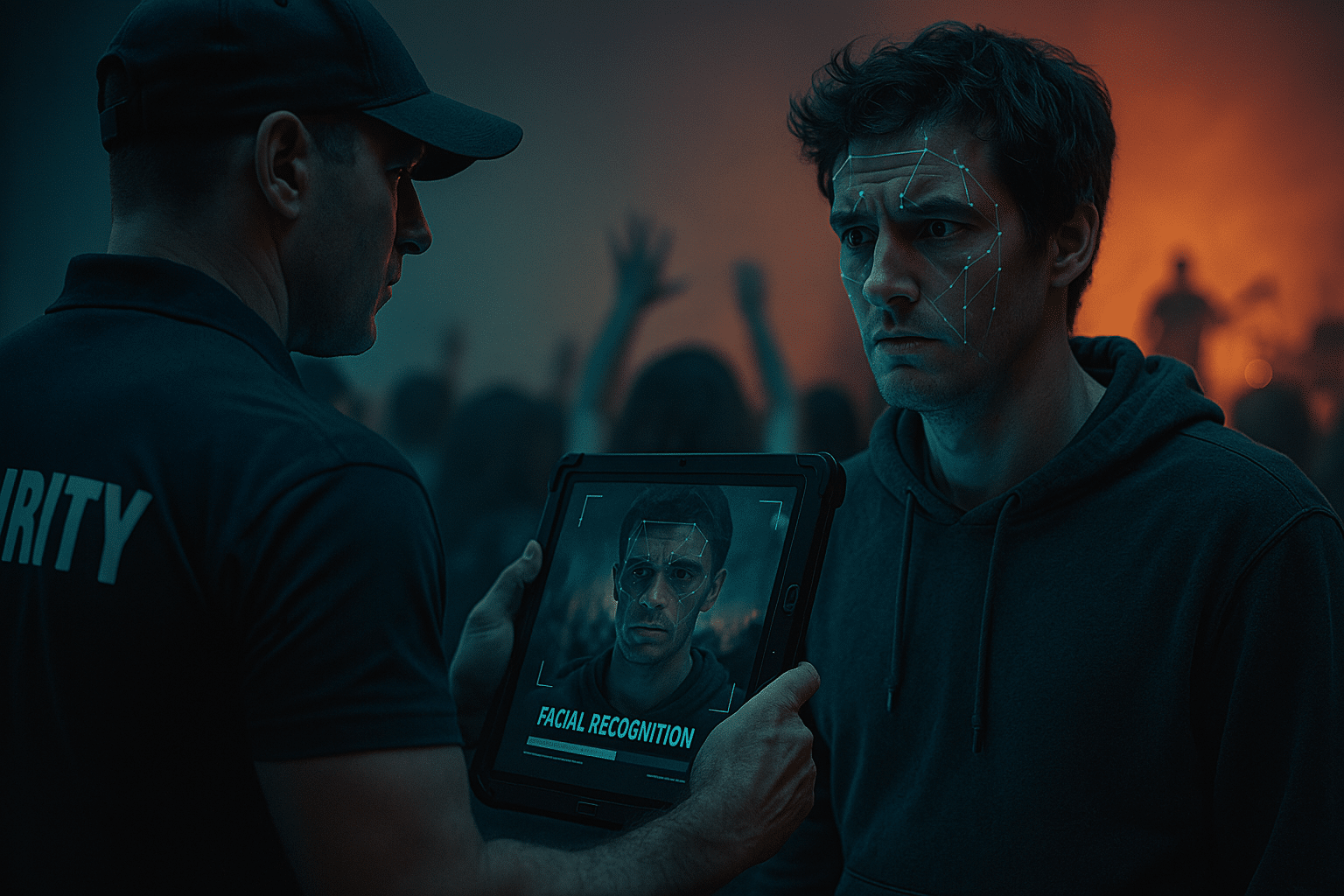
It’s not just undercover agents or FOIA-documented cases. New surveillance technologies are entering the live event space, often without fans’ knowledge. Facial recognition cameras, in particular, are rapidly being deployed at concerts, sports games, and other big events – a trend that alarms privacy advocates. In 2018, pop star Taylor Swift made headlines for using facial recognition at her Rose Bowl concert to scan for known stalkers. Concertgoers strolling by a kiosk were secretly filmed; their faces were matched against a database of suspects. While protecting artists is important, this incident opened eyes to how face-scanning can happen at events without attendees’ consent.
Ticketing giants are also investing in this technology. Ticketmaster’s parent company, Live Nation, announced plans to implement facial recognition at live events, letting customers “walk past face-scanning cameras instead of presenting a ticket”. In fact, Live Nation invested in a facial recognition firm (Blink Identity) to bring this to venues. The goal sounds convenient – your face is your ticket – but it doubles as a mass surveillance system. Every fan’s face could be scanned, recorded, and potentially linked to their identity and ticket purchase.
Privacy advocates warn of chilling consequences. A coalition of musicians and digital rights groups launched a campaign to ban facial recognition at concerts, calling it “uniquely dangerous” and “invasive”. They argue it “doesn’t keep fans or artists safe, it just subjects them to invasive, racially biased monitoring” and could lead to “fans getting harassed, falsely arrested, deported, or worse” due to misidentifications. These aren’t hypothetical fears — they’re based on real incidents. In China, police famously used facial recognition to spot and arrest a man attending a 60,000-person concert in 2018. Think about that: one face in tens of thousands, plucked out by software and matched to a warrant. If that technology is at your next arena show, any government or law enforcement agency with access could theoretically do the same, scanning for “persons of interest” in the crowd.
The permanent recording and data sharing from such tech is troubling. Experts note that face images captured at events can be stored in government databases indefinitely, meaning attending a concert could land your biometric data in a law enforcement or immigration database. When combined with other data (like your ticket purchase record, or your social media posts about the event), authorities can assemble a detailed profile of your activities. Attending the “wrong” concert (from an official’s perspective) could flag you in a surveillance system.
In short, modern concerts can become surveillance dragnets. From FOIA-proven FBI monitoring to covert face-scans, Big Brother might be in the audience next to you. This reality raises serious concerns for anyone who values privacy, freedom of expression, or simply enjoying live events without being watched. And it’s not only governments doing the watching – often, they get an assist from the very companies selling you the ticket. This means you can’t buy an online ticket or attend a popular and successful event without being completely free from being tracked by other entities. Selling tickets for an event on its own could put you on a watch list!
How Traditional Ticketing Platforms Put Fans Under the Microscope

Beyond on-site surveillance, the ticketing platforms and companies running events have built their own surveillance capitalism empires. If you’ve ever bought a concert ticket online through a major platform like Ticketmaster, you’ve handed over a trove of personal data. This is especially true if you sell event tickets through a similar online ticketing platform. Your name, email, phone number, billing address, and payment details are just the beginning. Centralized ticketing platforms routinely collect and store detailed information on every customer – and they don’t keep it to themselves. Buying and selling tickets online privately is difficult, if not impossible, and never user friendly.
According to Ticketmaster’s own privacy policy (under Live Nation Entertainment), the company tracks not just your purchase details, but also your browsing behavior, device identifiers, precise geolocation, and even CCTV footage at venues. For instance, Live Nation admits it may collect “pertinent personal information” and video via security cameras at venues during events. It also logs your device’s IP address, what site you came from, and where you go next. In other words, from the moment you buy your event tickets to the moment you leave the show, a centralized platform is gathering data points about you. This data can paint a very intimate picture: which concerts you attend, who you go with (if you bought multiple event tickets), how you got there (via location data), and how you behave online before and after the event.
Why should this worry you? First, all that personal data sits in one big honeypot, a centralized database. That makes it a prime target for hackers and state actors alike. We’ve seen the fallout: in 2024, Ticketmaster suffered a massive data breach, exposing the personal details of possibly 560 million customers. Hackers obtained names, home addresses, phone numbers, and partial payment info, and even attempted to sell this data on the dark web. If you bought event tickets in recent years, there’s a chance your info is now out in the wild due to this single breach. Centralization creates a single point of failure: one hack and millions of fans’ identities are spilled. For concertgoers, that could mean anything from phishing attacks in your inbox to, in worst cases, your attendance at certain events being made public. (Imagine an activist who thought their participation in a protest concert was private, only to find their name leaked in a data dump.)
Secondly, data collected by ticketing companies doesn’t just sit on a shelf. It is frequently shared or sold to third parties – and handed over to authorities upon request. Ticketmaster/Live Nation’s policy explicitly states: “We may share information… to comply with the law… We will share information to respond to a court order or subpoena. We may also share information if a government agency or investigatory body requests it.”. In plain English, if law enforcement shows up with even a semi-formal request, your ticketing provider will give them your data – no warrant needed in some cases. Going to a controversial concert or a politically charged event using a mainstream ticket vendor means creating a personal data trail that authorities can and will follow. Even without a request, Ticketmaster shares your info widely: with promoters, venues, “event partners,” and advertisers. Ever wonder how a week after buying event tickets you get bombarded with emails from related sponsors or political campaigns? That’s your data shared on an online ticketing platform doing laps through various marketing channels.
Finally, traditional online ticketing platforms make anonymity practically impossible. Buying a event ticket usually means using a credit card or verified payment (tying your real identity). E-tickets are often issued in your name, sometimes requiring ID at entry. Some platforms mandate user accounts with verified emails or phone numbers to buy or sell event tickets online. There’s no such thing as an “anonymous event registration” on these systems – your attendance is linked to your identity by default. For most innocuous events, this might seem like no big deal. But consider organizers of, say, a politically sensitive rally, a counterculture festival, or an LGBTQ+ event in a conservative area. Using a ticket sales platform like Ticketmaster means handing a list of all attendees (names, emails, possibly addresses) to a large corporation that must fork it over to authorities if asked. In recent history, we’ve seen U.S. agencies subpoena tech companies for lists of people who attended protests or visited certain websites. A centralized ticket database is low-hanging fruit for investigators. In one case, the U.S. government demanded data on visitors to a protest website (via a web host) – imagine how much easier it is to demand records from event ticket sales which already neatly catalog who was at an event and how to reach them.
The Risks of Centralized Ticketing at a Glance:
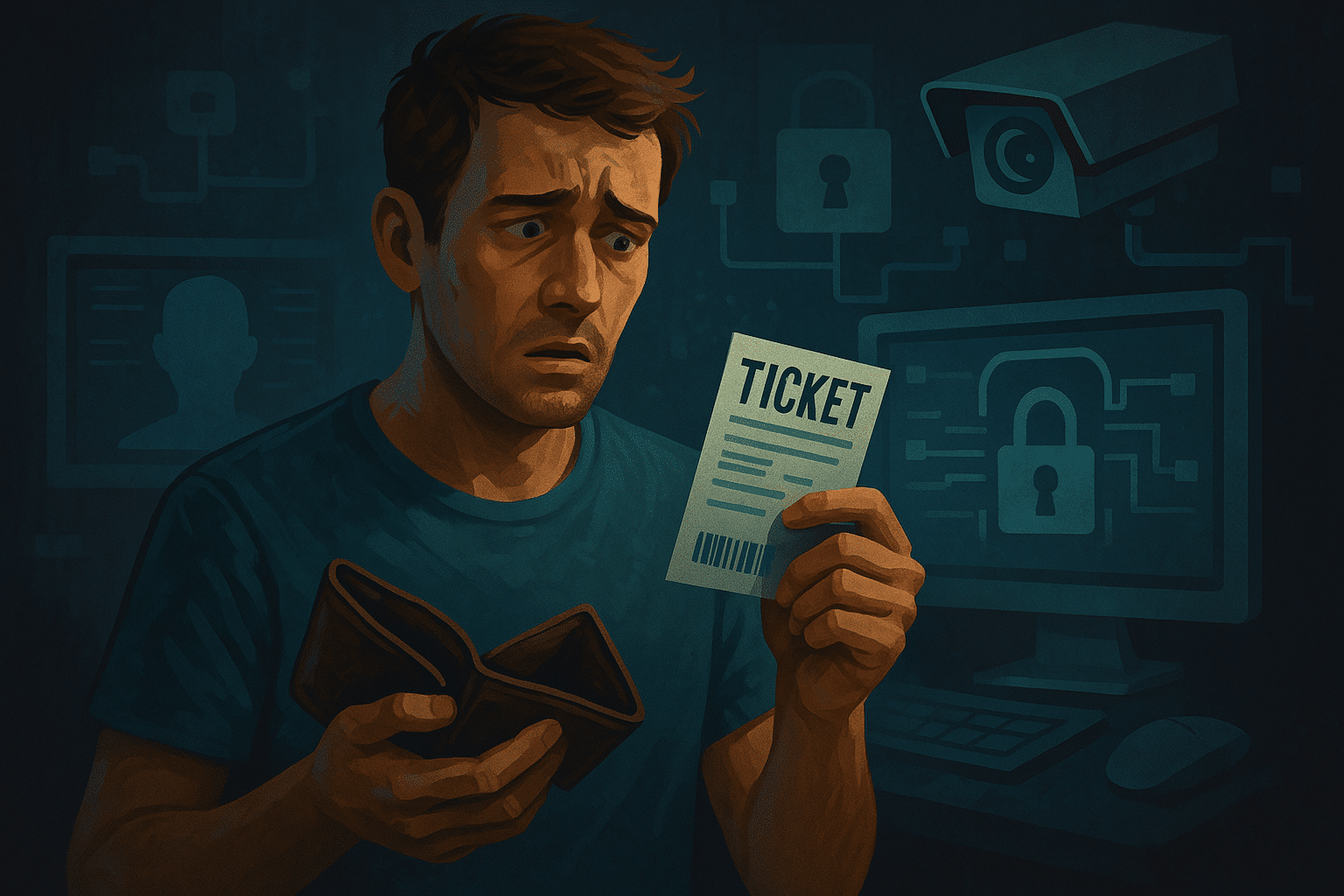
Extensive Data Collection: Platforms like Ticketmaster collect personal details (name, contact, payment), track your online behavior and location, and even record your presence via venue cameras. This creates a detailed profile with no privacy for the attendee. If you plan to start selling tickets online, you will also be required to provide extensive KYC.
Data Sharing & Government Access: Your information isn’t kept confidential. It’s shared with promoters, advertisers, and handed to authorities on request. The company’s policy openly states it will comply with subpoenas or any government agency request for data. There is zero anonymity – if Big Brother wants to know who bought event tickets to a certain show, the platform offering the ticketing software or event website will oblige.
Surveillance Technologies: Major ticketing firms have embraced invasive tech like facial recognition at events, further eroding privacy. Ticketmaster’s trials of face-scanning entry mean your biometric data could be linked to your online ticket purchase – combining surveillance footage with your identity and even home address on file.
Security Breaches: Central databases are huge targets. The 2024 Ticketmaster breach showed how millions of attendees can have their personal data leaked in one go. Victims not only face fraud risks but also the potential exposure of what events they attended, which could be sensitive. You can’t buy tickets online from traditional event ticketing providers without exposing this information to the risk of compromise.
No Participant Autonomy: With centralized systems, event organizers and attendees have no control over data once it’s in the platform. You can’t easily opt out of data collection or sharing. You’re forced to trust the ticketing platform’s security and ethics – and as we’ve seen, that trust is often misplaced.
The picture is clear: traditional ticketing systems come with a heavy price beyond the service fees. It forces both attendees and event hosts to sacrifice privacy. For organizers of controversial or underground events especially, this is a huge risk – your attendee list can end up in the wrong hands. For fans, it means your live event habit generates a trail that corporations and governments can follow. The stakes are highest for communities that rely on anonymity for safety (dissidents, activists, marginalized groups).
Is there a way to enjoy concerts and sell tickets without playing into this surveillance machine? Yes – and that’s where Cheers Finance steps in, changing the game.
The Need for Anonymous Event Registration in 2025
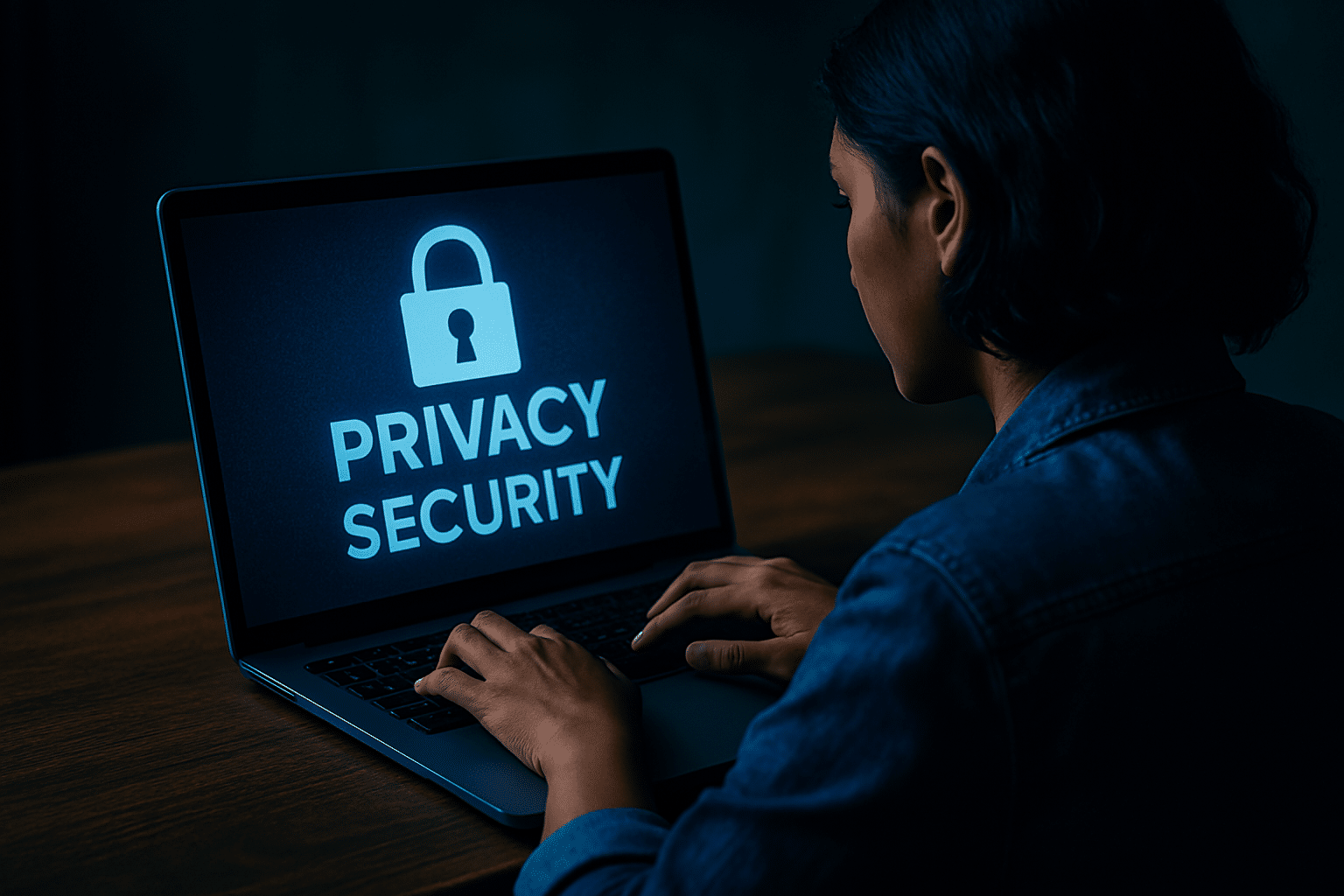
In an era of data breaches and surveillance, privacy isn’t just a nicety – it’s a necessity for the live events community. Fans and organizers are increasingly seeking ways to buy and sell concert tickets without exposing personal information. The demand for a private ticketing system has grown, especially for events that might attract scrutiny. If a concert’s message challenges authority, or if a festival caters to an underground subculture, attendees may rightfully worry that their event ticket purchase could later be used against them. We’ve reached a point where online ticket sales should offer the option of anonymity, just as paying cash at a door once did. You should not have to expose personal information to compromise simply to be granted access.
Think of politically charged benefit concerts, protests, or even something like a cannabis expo in a state where laws are evolving. Traditional ticketing platforms would collect identities of everyone attending, creating a roadmap for authorities or even cybercriminals. Anonymous event registration can empower these events to happen without putting participants at risk. People are more likely to attend and support causes if they know their privacy is protected. Conversely, surveillance fears can have a chilling effect – causing self-censorship and low turnout due to fear of being “on a list.”
The urgency is real. Recent viral stories of surveillance and data misuse have made the public acutely aware. When half a billion ticket buyers’ data might be floating on the dark web after a breach, or when fans learn that face recognition could flag them to police at a show, they start looking for alternatives. Just as encrypted messaging apps rose in popularity after snooping scandals, privacy-first ticketing is becoming the next demand. We need systems that let event organizers sell concert tickets online without forcing attendees to surrender their identities. This is about protecting basic freedoms – the freedom to assemble, to express, to enjoy art – without being tracked.
Enter Cheers Finance, a platform built to answer that call. Cheers Finance is a decentralized ticketing and event management ticketing platform designed for the privacy-conscious era. It’s not just a new ticket app; it’s a fundamentally different model that flips the power dynamic. With Cheers, fans and organizers stay in control – not faceless corporations, and certainly not surveillance-happy middlemen.
Cheers Finance: A New Era of Private, Decentralized Ticketing

Cheers Finance is bringing anonymity and freedom back to live events. It’s a blockchain-based ticketing platform that allows organizers to host events and sell tickets online without big intermediaries like Ticketmaster – and without harvesting attendees’ personal data. In short, it’s a online ticketing system where you call the shots and your privacy stays intact.
What makes Cheers Finance different? Unlike traditional platforms, Cheers is decentralized: it runs on blockchain smart contracts rather than centralized servers. Tickets are issued as unique NFTs (non-fungible tokens) to buyers’ crypto wallets, rather than PDF files tied to your name and email. If that sounds technical, here’s why it matters: you can purchase or transfer a ticket using just a blockchain address (essentially an account number) – no login, no email, no credit card info required. There’s no KYC process (Know Your Customer identity verification) to buy or sell tickets on Cheers. You don’t have to scan your government ID or plug in a bunch of personal details to use the platform. This means truly anonymous ticket purchases are possible. For the first time, you could sell tickets online and the buyers can remain pseudonymous, identified only by a wallet address. An outside party (or government agency) looking at the blockchain would see transactions, but not a list of full names linked to those tickets.
From an event organizer’s perspective, Cheers offers total control with minimal oversight. You set up your event’s smart contract with the parameters you want – pricing, number of tickets, ticket types or tiers available – and you’re not forced into the one-size-fits-all rules of a corporate platform. Because it’s decentralized, no central authority can censor your event or freeze your funds. This is critical for controversial or sensitive events.
For example, if you’re organizing a protest concert, you won’t wake up to find your event de-listed because some corporation got cold feet or received a call from officials. There’s no “kill switch” controlled by a third party with oppressive rules or regulations. Just check out the Cheers Finance Terms & Conditions. Your event lives on the blockchain network, immune to takedowns. Cheers Finance would only prevent host withdrawal and release funds back to buyers in the event of harm, such a as fraud (saying Prince played your concert when he’s dead, or hosting the next Fyre Festival) or violence (your event hosted the real life Squid Game).
Let’s break down the key benefits of Cheers Finance’s private ticketing system:
Anonymity for Attendees: Fans can purchase tickets without revealing personal info. No names, addresses or intrusive data collection – just an anonymous event registration via crypto wallet. This ensures surveillance-free attendance; even if someone tried to subpoena the “user list,” there’s no honeypot of real identities to grab.
No KYC, No Gatekeepers: Unlike traditional platforms that might require accounts and ID checks, Cheers has no KYC requirements. Anyone with a crypto wallet can participate. This lowers barriers for global users and protects those who can’t risk revealing identity. You can sell concert tickets to fans without them ever having to expose who they are, or vice versa!
Data Sovereignty & Security: Because user data isn’t collected en masse, there’s nothing for hackers to steal in a big breach. Ticket ownership is recorded on a secure blockchain ledger, not a hackable centralized database. No more worrying that a breach at a ticket company will spill your info – the platform simply doesn’t store that sensitive info. You can buy and sell event tickets securely without ever revealing it!
Low Fees & Fair Economics: Cheers is designed to be low-fee (or even fee-free) compared to Ticketmaster’s notorious service charges. In fact, Cheers advertises a “seamless, fee-free experience for attendees.” You won’t see 25% markups in mysterious fees. Smart contracts automate transactions cheaply, and without a monopoly in the middle, organizers can pass savings directly to fans. More affordable, transparent pricing is a huge bonus, separate from privacy but certainly welcome.
Total Control for Organizers: With Cheers, the host or event creators can create custom ticketing contracts to fit their needs, with most necessary features easily accessible and the ability to launch any event type in 5 minutes or less. With some technical skill, or future development on the Cheers online ticketing system, even more customization is possible. Want to cap resale prices to prevent scalping? Program it in. Need to limit tickets per person? It’s in your control. You’re not at the mercy of a giant platform’s rules or sudden policy changes. This also means if you’re hosting a sensitive event, you decide what info (if any) to collect from attendees. You could choose to keep your guest list truly off-grid. Cheers Finance is the only ticketing software you will ever need.
Censorship Resistance: Because it’s decentralized (run by a network of users, not a single company), no authority can easily shut down a Cheers Finance event or seize its ticket revenue. This is peace of mind for events that might face political pressure. Your revenue from online ticket sales through the Cheers Finance website go straight to you via the blockchain, with no bank or platform that can freeze them. Organizers maintain total control over their event and income – which is exactly as it should be for any host who sells tickets online.
Transparency and Trust: All transactions of buyers selling tickets online on Cheers Finance are recorded on the blockchain, which provides transparency without compromising identity. Fans and artists can verify ticket authenticity (no fake tickets!) and see that rules were followed, while still remaining pseudonymous. This balance of openness and privacy is something traditional systems can’t achieve. Ticketmaster might show you a “secure ticket,” but you have to trust them behind the scenes. With Cheers, trust is in the code and the decentralized network.
In practice, using Cheers Finance might look like this: You hear about a concert or event on the Cheers ticketing platform. You click the ticket link, which opens the Cheers Finance decentralized app. You connect your crypto wallet (which can be as anonymous as you want it to be) and approve the ticket purchase, paying in USDC stablecoin, same as the US dollar, with a small gas fee (much less than what Ticketmaster or other entities would charge in ticketing fees). An event ticket NFT is then delivered to your wallet – this is your entry pass. No one asked for your name, your documents, or ran a background check. When you show up at the event, entry could be managed by scanning the NFT’s QR code or using a simple verification that the NFT is in your wallet. The organizer might choose to require an anonymous code or something if needed for logistics, and legally they may ask to see proof of age depending on the event, but the point is no centralized database ever got a copy of your driver’s license or credit card. You remain effectively a phantom to prying eyes, yet a valid ticketholder to the event.
For privacy-minded event organizers, this model is revolutionary. Consider controversial art shows, activist meetups, or music festivals celebrating counterculture – all scenarios where participants might not want their names public. In the past, organizers had to choose between security (selling tickets online to manage ticket sales in a controlled way) and privacy (protecting their people). Cheers Finance means they no longer have to compromise privacy to drive online ticket sales. They can sell tickets in a controlled, efficient online ticket sale and guarantee anonymous attendance at the same time. It’s like selling tickets for cash at the door, but done online and at scale. There’s no better way to manage event ticket sales with privacy in mind.
Cheers Finance mission and ethos aligns with privacy and freedom — the users have a say, and no centralized authority can quietly decide to start exploiting data or jacking up fees. It’s a stark contrast to the Ticketmaster-Live Nation monopoly, which for years has left fans and artists with no seat at the table.
No More Compromises: Embrace Surveillance-Free Events

It’s 2025, and the era of surveillance-free concerts and truly private ticketing is finally within reach. We’ve outlined how government agencies have treated live events as hunting grounds for information, and how Big Ticketing has been all too eager to collect and hand over our data. But with innovations like Cheers Finance, the power is shifting back to us — the fans, the artists, the independent event creators.
Imagine the next time you sell concert tickets for a charity benefit show or underground music festival: instead of forcing attendees to go through a data-harvesting platform, you send them a Cheers link. Tickets sell out, you raise funds, and no one had to give up their identity to support the cause. The crowd shows up enthusiastic and unafraid, knowing Big Brother isn’t watching over their shoulder for once. This isn’t a fantasy scenario; it’s a growing reality as decentralized tech meets event management.
The online ticket sales landscape is evolving. Just as we demand end-to-end encryption in our messages, we can demand end-to-end privacy in our ticketing. Cheers Finance proves that you can have a private ticketing system that is efficient and user-friendly. Fans shouldn’t have to trade personal data for the right to rock out at a concert, whether its specifically a private event or not. Organizers shouldn’t have to worry that by using a mainstream ticket platform to sell tickets, or for event management, they’re inadvertently creating a registry of everyone who believes in their message or art through event ticket sales, and trusting the data to potentially multiple third parties.
Privacy is a right, and it shouldn’t end at the venue door. With Cheers, anonymous event registration and decentralized ticketing mean that the only thing shared at your event is the experience – not attendees’ identities or surveillance data. Whether specifically hosting private events, or if you just want to protect your guests data at your next concert, Cheers is your all in on solution to selling tickets online. The tone of this revolution is professional in its technology and execution, but make no mistake, it’s bold and passionate in its ethos: we deserve to dance, to sing, to gather – without being tracked.
Organizers and fans around the world are starting to join this movement. The tools are here to sell tickets with no ticketing fees, technical experience, or expensive ticketing software. Low-fee, no-KYC, anonymous ticket sales are now possible, aligning financial freedom with personal freedom. It’s time to take a stand against the status quo of surveillance in live entertainment. By choosing platforms like Cheers Finance, you’re not just saving money or cutting out a middleman – you’re taking a stand for privacy and autonomy in the events you love.
The next time you plan or attend an event, ask yourself: Do I want Big Tech and Big Brother in the room with me and my community? If the answer is no, you have a choice. Cheers Finance is that choice, offering a safe haven to buy and sell tickets for events that value freedom. Selling tickets anonymously, with no surveillance and total control, is not only possible – it’s here. The music world has long sung about rebellion and liberation. Ticketing itself can now embody those ideals, completely free from censorship while fulfilling our need for privacy.
That’s something to cheer about, indeed.
Sources:

Baddour, Dylan. Houston Chronicle – FBI surveillance of Burning Man
https://www.chron.com/national/article/FBI-spied-on-Burning-Man-music-festival-6485427.phpLibrary of Congress – FBI/CIA surveillance of folk musicians in mid-20th centuryhttps://www.loc.gov/item/2021688002/
Holub, Christian. Entertainment Weekly – FBI files on The Monkees’ concerts
https://ew.com/music/the-monkees-micky-dolenz-sues-the-fbi-over-surveillance-file/Rose, Janus. VICE – Campaign against facial recognition at concerts; Ticketmaster’s plans for face-scanning entry
https://www.vice.com/en/article/musicians-demand-ticketmaster-ban-facial-recognition-at-concerts/Biometric Update – Facial recognition risks (misidentification, government databases, etc.) at events
https://www.biometricupdate.com/201909/facial-recognition-at-music-festivals-targeted-california-police-ban-softens-and-school-district-pausesLive Nation Entertainment Privacy Policy – Data sharing with partners and authorities (Ticketmaster), Data collected (CCTV, personal info, device data)
https://help.livenation.com/hc/en-us/articles/10464047306641-Live-Nation-Entertainment-Privacy-PolicyGecsoyler, Sammy. The Guardian – Ticketmaster 2024 data breach affecting up to 560M users
https://www.theguardian.com/technology/article/2024/jun/01/live-nation-investigating-data-breach-of-its-us-ticketmaster-unitCheers Finance (LinkedIn page) – Decentralized ticketing, fee-free experience for attendees
https://www.linkedin.com/company/cheers-finance/Cheers Finance Whitepaper (Medium) – NFT-based decentralized ticketing overview
https://cheersfinance.medium.com/cheers-finance-whitepaper-7f59f8163920
